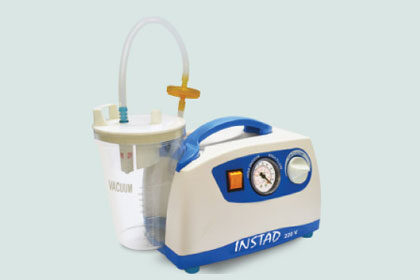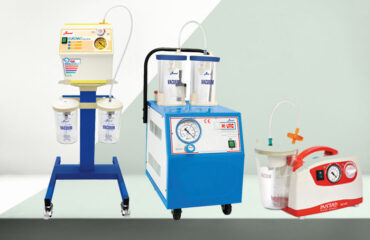
Suction machines, also known as suction units or aspirators, are essential medical devices used to remove excess fluids, secretions, or foreign materials from a patient’s airway or body cavity. They play a crucial role in various medical settings, from hospitals and clinics to emergency medical services and home care. In this blog, we’ll delve into the diverse applications of suction machine, their components, and their significance in healthcare.
Understanding the Functionality of Suction Machines: Suction machines operate on a simple yet effective principle: they create a vacuum to draw out fluids or debris from a patient’s body. The machine consists of several components, including a suction pump, tubing, a collection canister, and sometimes, specialized attachments or catheters. The suction pump generates negative pressure, which is transmitted through the tubing to the collection canister, where the extracted fluids are stored.
Suction Machine Manufacturer from India
Applications of Suction Machines in Healthcare:
- Airway Clearance: One of the primary uses of suction machines is to clear the airway of secretions or obstructions. This is particularly critical in emergency situations such as choking or respiratory distress, where prompt suctioning can be life-saving.
- Surgical Procedures: Suction machines are indispensable tools in surgical settings, where maintaining a clear surgical field is essential for the success of the procedure. Surgeons use suction to remove blood, fluids, and debris from the surgical site, ensuring optimal visibility and precision.
- Respiratory Therapy: Patients with respiratory conditions such as COPD, pneumonia, or bronchitis may require suctioning to remove excess mucus or secretions from their airways. Suction machines facilitate this process, helping to improve breathing and prevent complications.
- Wound Care: In wound management, suction machines are used to remove exudate, pus, or other fluids from wounds or surgical sites. This promotes healing by reducing the risk of infection and facilitating the formation of healthy tissue.
- Home Care: Suction machines are also used in home healthcare settings, particularly for patients who require ongoing respiratory support or have difficulty clearing their airways independently. Portable suction units enable caregivers to provide necessary suctioning at home, improving patient comfort and safety.
Conclusion: The Vital Role of Suction Machines in Healthcare
In conclusion, suction machines are indispensable tools in the realm of healthcare, serving a multitude of purposes across various medical specialties. From emergency airway clearance to surgical procedures, respiratory therapy, wound care, and home healthcare, these devices play a vital role in maintaining patient safety and promoting optimal outcomes. As essential components of medical equipment, suction machines embody the commitment of healthcare professionals to provide quality care and ensure the well-being of patients.
Why Choose Anand Suction Machines?
Anand Medicaids has been a pioneer in manufacturing high-quality suction machines for over five decades, setting industry benchmarks in efficiency, reliability, and innovation. Here’s why our suction machines stand out:
✔ Unmatched Quality & Performance – Engineered for precision and durability, Anand suction machines ensure consistent, powerful suction for efficient fluid removal, making them ideal for hospitals, clinics, and emergency use.
✔ Wide Range of Suction Solutions – We offer an extensive portfolio, including medical suction units, wound suction units, and portable suction devices, catering to diverse medical needs.
✔ Cutting-Edge Technology – Our machines incorporate advanced motor technology, noise reduction mechanisms, and user-friendly controls for enhanced usability and performance.
✔ Trusted by Healthcare Professionals – With over 35 years of industry experience, we have built a strong reputation and earned the trust of hospitals, medical institutions, and healthcare providers worldwide.
✔ Cost-Effective & Reliable – Anand suction machines are designed for long-lasting performance while remaining affordable and easy to maintain, ensuring exceptional value for money.
For superior medical suction solutions, trust Anand Medicaids – delivering excellence in medical technology.




